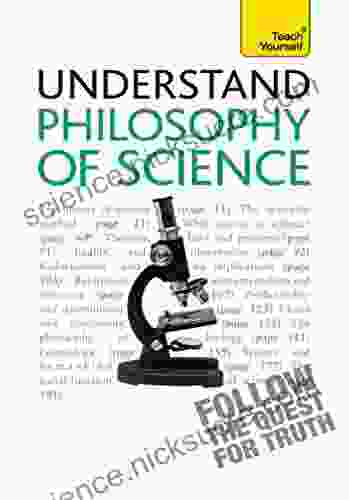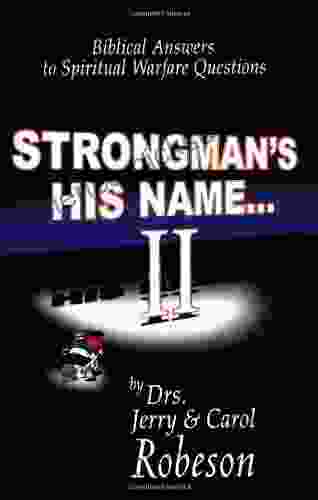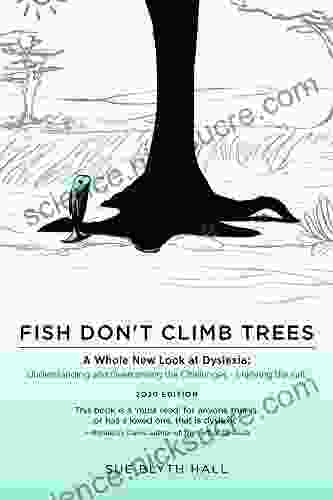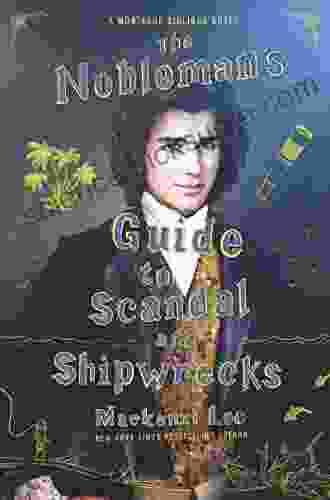The Essential Guide to Teaching Yourself the Philosophy of Science

The philosophy of science is a branch of philosophy that studies the foundations, methods, and implications of science. It is a vast and complex field, but it is also one that is essential for understanding the nature of science and its role in our world.
If you are interested in learning more about the philosophy of science, there are a number of resources available to help you get started. You can find books, articles, and online courses on the subject. You can also attend lectures and workshops given by philosophers of science.
4.6 out of 5
| Language | : | English |
| File size | : | 551 KB |
| Text-to-Speech | : | Enabled |
| Screen Reader | : | Supported |
| Enhanced typesetting | : | Enabled |
| Word Wise | : | Enabled |
| Print length | : | 208 pages |
However, one of the best ways to learn about the philosophy of science is to teach it yourself. This will allow you to explore the subject in depth and develop your own understanding of its key concepts.
To teach yourself the philosophy of science, you will need to do some reading and research. You will also need to think critically about what you read and be willing to challenge your own assumptions.
The following guide will provide you with an overview of the philosophy of science and help you get started on your journey to understanding this fascinating field.
History of the Philosophy of Science
The philosophy of science has its roots in the ancient Greek tradition. The Greek philosophers Plato and Aristotle were among the first to develop theories about the nature of science and its methods.
During the Middle Ages, the philosophy of science was largely dominated by the work of the Christian theologians. These theologians sought to reconcile the teachings of Christianity with the findings of science.
In the Renaissance, the philosophy of science began to emerge as a separate discipline. The Italian philosopher Galileo Galilei was one of the most important figures in the development of the philosophy of science. Galilei argued that science should be based on observation and experimentation, rather than on religious dogma.
The philosophy of science continued to develop throughout the Enlightenment and the 19th century. During this time, philosophers such as David Hume, Immanuel Kant, and John Stuart Mill made important contributions to the field.
In the 20th century, the philosophy of science became increasingly influenced by the work of the logical positivists. The logical positivists argued that science should be based on logic and mathematics, and that metaphysical claims should be rejected.
Today, the philosophy of science is a diverse field that encompasses a wide range of topics. Philosophers of science work on issues such as the nature of scientific explanation, the relationship between science and society, and the ethics of science.
Key Concepts in the Philosophy of Science
The philosophy of science is a complex field, but there are a number of key concepts that are essential for understanding the subject.
These concepts include:
- Science: Science is a systematic and organized body of knowledge about the natural world. It is based on observation, experimentation, and reason.
- Scientific method: The scientific method is a set of procedures that scientists use to investigate the natural world. It involves making observations, formulating hypotheses, testing hypotheses, and drawing s.
- Theory: A theory is a well-supported explanation of a natural phenomenon. It is based on evidence and is capable of making predictions.
- Law: A law is a statement that describes a regular relationship between two or more variables. Laws are based on observation and experimentation, and they can be used to make predictions.
- Falsifiability: Falsifiability is the property of a theory that makes it possible to test the theory and potentially disprove it.
Applications of the Philosophy of Science
The philosophy of science has a wide range of applications. It can be used to:
- Understand the nature of scientific knowledge: The philosophy of science can help us to understand how science works and how we can use it to learn about the natural world.
- Evaluate scientific claims: The philosophy of science can help us to evaluate scientific claims and determine whether they are supported by evidence.
- Make decisions about science policy: The philosophy of science can help us to make decisions about science policy, such as how much funding to allocate to scientific research.
- Teach science: The philosophy of science can help us to teach science more effectively. It can help us to understand the nature of science and how to communicate scientific information to students.
How to Teach Yourself the Philosophy of Science
If you are interested in teaching yourself the philosophy of science, there are a number of resources available to help you get started.
Here are a few tips:
- Start with an introductory textbook: There are a number of excellent introductory textbooks on the philosophy of science.
- Read journal articles: Journal articles are a great way to stay up-to-date on the latest research in the philosophy of science.
- Attend lectures and workshops: Many universities and colleges offer lectures and workshops on the philosophy of science.
- Talk to philosophers of science: If you have the opportunity, talk to philosophers of science about their work.
Teaching yourself the philosophy of science is a challenging but rewarding task. By following these tips, you can get started on your journey to understanding this fascinating field.
4.6 out of 5
| Language | : | English |
| File size | : | 551 KB |
| Text-to-Speech | : | Enabled |
| Screen Reader | : | Supported |
| Enhanced typesetting | : | Enabled |
| Word Wise | : | Enabled |
| Print length | : | 208 pages |
Do you want to contribute by writing guest posts on this blog?
Please contact us and send us a resume of previous articles that you have written.
 Fiction
Fiction Non Fiction
Non Fiction Romance
Romance Mystery
Mystery Thriller
Thriller SciFi
SciFi Fantasy
Fantasy Horror
Horror Biography
Biography Selfhelp
Selfhelp Business
Business History
History Classics
Classics Poetry
Poetry Childrens
Childrens Young Adult
Young Adult Educational
Educational Cooking
Cooking Travel
Travel Lifestyle
Lifestyle Spirituality
Spirituality Health
Health Fitness
Fitness Technology
Technology Science
Science Arts
Arts Crafts
Crafts DIY
DIY Gardening
Gardening Petcare
Petcare Michael D Rich
Michael D Rich Matt Mosher
Matt Mosher Cynthia Clumeck Muchnick
Cynthia Clumeck Muchnick Mary Basick
Mary Basick Nilakantasrinivasan J Neil
Nilakantasrinivasan J Neil Jerry Robeson
Jerry Robeson Jay Annelli
Jay Annelli Nancy Hughes
Nancy Hughes George Monbiot
George Monbiot Elizabeth Thompson
Elizabeth Thompson Ron L Deal
Ron L Deal Samuel Carbaugh
Samuel Carbaugh Alana Chernila
Alana Chernila Marc M Triola
Marc M Triola Al Marlowe
Al Marlowe Rebekah Sack
Rebekah Sack Alan Booth
Alan Booth Alex Light
Alex Light Jon Emmett
Jon Emmett Ilan Dvir
Ilan Dvir Timothy C Smith
Timothy C Smith Craig Childs
Craig Childs Al Desetta M A
Al Desetta M A Pallas Snider
Pallas Snider William Foote Whyte
William Foote Whyte Jay H Lefkowitch
Jay H Lefkowitch Alice Oseman
Alice Oseman Aileen Nielsen
Aileen Nielsen Conor Daly
Conor Daly Andrew Blum
Andrew Blum Takuan Soho
Takuan Soho Letisha Galloway
Letisha Galloway Stephen Wolfram
Stephen Wolfram Gary Player
Gary Player Lisa Newton
Lisa Newton Nick Lyons
Nick Lyons Nick Hughes
Nick Hughes Rick Bass
Rick Bass Thomas Kurz
Thomas Kurz Joe Berardi
Joe Berardi Edupan7 Publishing
Edupan7 Publishing Stephen M Camarata
Stephen M Camarata Satya Sundar Sethy
Satya Sundar Sethy Tom Shachtman
Tom Shachtman David F Kelly
David F Kelly Michal Stawicki
Michal Stawicki David Vine
David Vine Carol Tuttle
Carol Tuttle Arnold Yates
Arnold Yates Mike Rothschild
Mike Rothschild Dave Heller
Dave Heller Alan E Sparks
Alan E Sparks Amye Archer
Amye Archer Nassim Nicholas Taleb
Nassim Nicholas Taleb Kim Stanley Robinson
Kim Stanley Robinson John Irving
John Irving Suze Guillaume
Suze Guillaume Habeeb Quadri
Habeeb Quadri Alan Graham
Alan Graham Sara Hanover
Sara Hanover Dylan Alcott
Dylan Alcott David Roberts
David Roberts Stephanie Izard
Stephanie Izard Judy Jewell
Judy Jewell Christopher Hellman
Christopher Hellman Emeran Mayer
Emeran Mayer Dr Guy Leschziner
Dr Guy Leschziner 12th Edition Kindle Edition
12th Edition Kindle Edition Amy Edelstein
Amy Edelstein Ndeye Labadens
Ndeye Labadens Chris Vines
Chris Vines Kai Nacke
Kai Nacke Vera Nazarian
Vera Nazarian Mike Martin
Mike Martin Hannah Ewens
Hannah Ewens Mark Goulston
Mark Goulston Daniel C Okpara
Daniel C Okpara Chris Klug
Chris Klug Cindy Hudson
Cindy Hudson Kiku Hughes
Kiku Hughes Arthur Fleischmann
Arthur Fleischmann Francesca Lia Block
Francesca Lia Block Susan B Lovejoy
Susan B Lovejoy Taquetta Baker
Taquetta Baker M K Hume
M K Hume Matthew Mcbee
Matthew Mcbee Peg Tyre
Peg Tyre Jacqueline Tourville
Jacqueline Tourville Vanessa Ogle
Vanessa Ogle William A Kaplin
William A Kaplin Alan Lawrence Sitomer
Alan Lawrence Sitomer Molly Absolon
Molly Absolon Michael W King
Michael W King Dimitri Loose
Dimitri Loose Nina Lacour
Nina Lacour Douglas G Altman
Douglas G Altman Alan Lightman
Alan Lightman Elaine Howard Ecklund
Elaine Howard Ecklund John J Miller
John J Miller James Willard Schultz
James Willard Schultz Bruce Lee
Bruce Lee Andrew Jamieson
Andrew Jamieson Melissa Bashardoust
Melissa Bashardoust Leigh Sales
Leigh Sales Snap Summaries
Snap Summaries Olivia Gentile
Olivia Gentile Terry Funk
Terry Funk Hiro Ainana
Hiro Ainana Albert Einstein
Albert Einstein Shing Tung Yau
Shing Tung Yau Michael Morpurgo
Michael Morpurgo Len Sperry
Len Sperry Damon Lee
Damon Lee Alan Shipnuck
Alan Shipnuck Rob Casey
Rob Casey Joe Bertagna
Joe Bertagna Gail Tully
Gail Tully Alan Murchison
Alan Murchison Anders Halverson
Anders Halverson Kate Bettison
Kate Bettison Dr Joseph Parent
Dr Joseph Parent James A Michener
James A Michener Saul Rip
Saul Rip Vasilis Konstantinos Giontzis
Vasilis Konstantinos Giontzis J Zoltan
J Zoltan Michael Miller
Michael Miller Roxy And Ben Dawson
Roxy And Ben Dawson Jacob K Olupona
Jacob K Olupona United States Government Us Marine Corps
United States Government Us Marine Corps S A Klopfenstein
S A Klopfenstein Judith Garrard
Judith Garrard Aileen Erin
Aileen Erin Michael Domican
Michael Domican Charles B White
Charles B White Bob Plott
Bob Plott Charles J Thayer
Charles J Thayer Sara Wickham
Sara Wickham Alan Vermilye
Alan Vermilye Bianca Smith
Bianca Smith Mel Thompson
Mel Thompson Karen Levin Coburn
Karen Levin Coburn Jane Bottomley
Jane Bottomley Mykel Hawke
Mykel Hawke Lex Croucher
Lex Croucher Gina Guddat
Gina Guddat Pantea Kalhor
Pantea Kalhor Kiersten White
Kiersten White Bill Walker
Bill Walker Jessica Battilana
Jessica Battilana Mark Booth
Mark Booth Paramahansa Yogananda
Paramahansa Yogananda George Knudson
George Knudson E Cheng
E Cheng Franz Metcalf
Franz Metcalf Martin Rooney
Martin Rooney Trevor Lund
Trevor Lund Dennis Jarecke
Dennis Jarecke G E R Lloyd
G E R Lloyd Jacqueline Fitzpatrick
Jacqueline Fitzpatrick Jordon Greene
Jordon Greene Sir Edmund Hillary
Sir Edmund Hillary Barbara Oehlberg
Barbara Oehlberg Daphne Rose Kingma
Daphne Rose Kingma Alastair Humphreys
Alastair Humphreys Michael Sidgwick
Michael Sidgwick Isabella Morris
Isabella Morris John Bird
John Bird Donald Woods Winnicott
Donald Woods Winnicott Michael Gray
Michael Gray Robert M Emerson
Robert M Emerson Juno Roche
Juno Roche Josh Kilmer Purcell
Josh Kilmer Purcell David Jason
David Jason Courtney Macavinta
Courtney Macavinta Steven Horak
Steven Horak Lee Carroll
Lee Carroll Robert A Sadowski
Robert A Sadowski Thubten Chodron
Thubten Chodron Al Strachan
Al Strachan Denise Alvarado
Denise Alvarado Mackenzi Lee
Mackenzi Lee Linda G Morris
Linda G Morris Anthonissa Moger
Anthonissa Moger Rehana Jawadwala
Rehana Jawadwala Alan Porter
Alan Porter John Leo
John Leo Bill Parisi
Bill Parisi Antipodean Writer
Antipodean Writer Kidada Jones
Kidada Jones Paul G Schempp
Paul G Schempp Deitra Leonard Lowdermilk
Deitra Leonard Lowdermilk Noel St Clair
Noel St Clair The Rogue Hypnotist
The Rogue Hypnotist Joe Clement
Joe Clement Dorothy H Crawford
Dorothy H Crawford Ainsley Arment
Ainsley Arment Steven Trimble
Steven Trimble John Feinstein
John Feinstein Michael Shermer
Michael Shermer Aidan Comerford
Aidan Comerford Ai Publishing
Ai Publishing Wayne Stewart
Wayne Stewart Alan C Acock
Alan C Acock Martin Erwig
Martin Erwig Alan R Hall
Alan R Hall Natazha Raine O Connor
Natazha Raine O Connor Jack Nicklaus
Jack Nicklaus George Plimpton
George Plimpton Jacqueline Church Simonds
Jacqueline Church Simonds Sandy Lindsey
Sandy Lindsey Anahad O Connor
Anahad O Connor Bryan Mann
Bryan Mann Jeanne Faulkner
Jeanne Faulkner Al Barkow
Al Barkow Spencer Wells
Spencer Wells Brian Mills
Brian Mills Kevin Williams
Kevin Williams Carla Schroder
Carla Schroder Gavin Francis
Gavin Francis Andre Agassi
Andre Agassi Yang Jwing Ming
Yang Jwing Ming Don Casey
Don Casey Christopher Gavigan
Christopher Gavigan Leif K Karlsen
Leif K Karlsen Jerry Robertson
Jerry Robertson William Harding
William Harding Gillian Gill
Gillian Gill Billy Walsh
Billy Walsh Christopher Willard
Christopher Willard Dean Burnett
Dean Burnett Chris Bowers
Chris Bowers Richard Pears
Richard Pears Timm Woods
Timm Woods Sophia Joy
Sophia Joy George M Fredrickson
George M Fredrickson Ken Denmead
Ken Denmead Ken Schultz
Ken Schultz Meredith Marsh
Meredith Marsh Steve Michalik
Steve Michalik Christopher Scordo
Christopher Scordo Anne Enright
Anne Enright Dawn Sakamoto Paiva
Dawn Sakamoto Paiva Alfred S Posamentier
Alfred S Posamentier Jane P Gardner
Jane P Gardner Brandy Roon
Brandy Roon Rose Lynn Fisher
Rose Lynn Fisher Mark Drolsbaugh
Mark Drolsbaugh Edward A Tiryakian
Edward A Tiryakian Eddy Starr Ancinas
Eddy Starr Ancinas I Johnson
I Johnson Dr David Geier
Dr David Geier Joyce Burkhalter Flueckiger
Joyce Burkhalter Flueckiger Graham Bower
Graham Bower Clint Emerson
Clint Emerson Andy Adams
Andy Adams Amelia Mayer
Amelia Mayer Mendocino Press
Mendocino Press Erin Ekins
Erin Ekins Nicholas Romanov
Nicholas Romanov Alice Scordato
Alice Scordato Al Ristori
Al Ristori John H Moore
John H Moore Rosemarie Anderson
Rosemarie Anderson Jill Homer
Jill Homer David D Burns
David D Burns Lj Andrews
Lj Andrews Al Yellon
Al Yellon Howard Greene
Howard Greene Esther Parry
Esther Parry Po Bronson
Po Bronson Percy Boomer
Percy Boomer Mista Nove
Mista Nove Alan Rouse
Alan Rouse Rebecca Jones
Rebecca Jones Margit Ystanes
Margit Ystanes James F Boswell
James F Boswell Emily Harris Adams
Emily Harris Adams James Gleick
James Gleick S Connolly
S Connolly Sam J Fires
Sam J Fires Pavel Tsatsouline
Pavel Tsatsouline Martin Luther King Jr
Martin Luther King Jr Tenth Edition Revised Kindle Edition
Tenth Edition Revised Kindle Edition Jonathan Gottschall
Jonathan Gottschall Eden O Neill
Eden O Neill Kardas Publishing
Kardas Publishing Madeline Milne
Madeline Milne Contractor Education Inc
Contractor Education Inc Gordon R Dickson
Gordon R Dickson Hammad Fozi
Hammad Fozi R A Salvatore
R A Salvatore David King
David King Megan Gray Md
Megan Gray Md Amanda Ford
Amanda Ford Douglas T Hall
Douglas T Hall George E Andrews
George E Andrews Layla Moon
Layla Moon Deborah Harkness
Deborah Harkness Massad Ayoob
Massad Ayoob Mariam N Ottimofiore
Mariam N Ottimofiore Jeremy Miles
Jeremy Miles Alan E Kazdin
Alan E Kazdin Kevin B Shearer
Kevin B Shearer Martin J Pring
Martin J Pring Tod E Bolsinger
Tod E Bolsinger Dusty Rhodes
Dusty Rhodes Aja Raden
Aja Raden Beata Bliss Lewis Md
Beata Bliss Lewis Md Celeste Headlee
Celeste Headlee Cat Warren
Cat Warren Sheila Barton
Sheila Barton Gary Smith
Gary Smith Matthew Sturm
Matthew Sturm David A Sousa
David A Sousa Jessica Cornwell
Jessica Cornwell Jim Steenburgh
Jim Steenburgh Vernon Coleman
Vernon Coleman Orson Scott Card
Orson Scott Card Bradley Efron
Bradley Efron Steve Moore
Steve Moore Steven H Strogatz
Steven H Strogatz Hervey Garrett Smith
Hervey Garrett Smith Jan Smith
Jan Smith Florence Williams
Florence Williams Alan S Gurman
Alan S Gurman Jane Poynter
Jane Poynter Gary R Varner
Gary R Varner Teresa Mccallum
Teresa Mccallum John Riley
John Riley Frances E Jensen
Frances E Jensen Alan Burdick
Alan Burdick Jackson Katz
Jackson Katz Carl Gustav Jung
Carl Gustav Jung Lingo Mastery
Lingo Mastery Kerry Diamond
Kerry Diamond Al Pasha
Al Pasha Jay Speight
Jay Speight Terry Breverton
Terry Breverton Clyde Fitch
Clyde Fitch Catherine Belknap
Catherine Belknap Mike Warren
Mike Warren Alan Gelb
Alan Gelb Kristine Barnett
Kristine Barnett John Muir
John Muir Bobby Flay
Bobby Flay W E Fairbairn
W E Fairbairn Brenda Nathan
Brenda Nathan James Witts
James Witts Shoshana Levin Fox
Shoshana Levin Fox Theodore P Jorgensen
Theodore P Jorgensen Princess Her
Princess Her Laurie Pickard
Laurie Pickard Aidan Chambers
Aidan Chambers Al Sweigart
Al Sweigart Arnold Haultain
Arnold Haultain Tina Dreffin
Tina Dreffin Linda Welters
Linda Welters Marsha Wenig
Marsha Wenig Grace Lebow
Grace Lebow Gary B Ferngren
Gary B Ferngren G H Hardy
G H Hardy Collins Easy Learning
Collins Easy Learning Jeff Maynard
Jeff Maynard Bob Mayer
Bob Mayer Erica Westly
Erica Westly Kevin Hunter
Kevin Hunter Alan Margot
Alan Margot J R Haseloff
J R Haseloff Janice Selekman
Janice Selekman Akwaeke Emezi
Akwaeke Emezi Aphra Behn
Aphra Behn Marcus Chown
Marcus Chown Gayle Peterson
Gayle Peterson Gregory J Davenport
Gregory J Davenport Mark Harris
Mark Harris Constance Classen
Constance Classen Shaun Tomson
Shaun Tomson Andrew Rowe
Andrew Rowe Alan S Kaufman
Alan S Kaufman Terry L Duran
Terry L Duran Lauren Blackwood
Lauren Blackwood Mark Occhilupo
Mark Occhilupo Peter Irvine
Peter Irvine Aidan Dodson
Aidan Dodson Aileen Evans
Aileen Evans Tonya Johnston
Tonya Johnston Lexie Scott
Lexie Scott Ged Jenkins Omar
Ged Jenkins Omar Dan Dipiro
Dan Dipiro Erin Lovelace
Erin Lovelace Alan Garner
Alan Garner E A Koetting
E A Koetting Ahmed Osman
Ahmed Osman Kelly Jensen
Kelly Jensen Skeleton Steve
Skeleton Steve Alan Hearnshaw
Alan Hearnshaw Aimee Aristotelous
Aimee Aristotelous Markus Rex
Markus Rex Ann Hagedorn
Ann Hagedorn Aiva Books
Aiva Books Hope Smith
Hope Smith Juliet Marillier
Juliet Marillier Charlotte Markey
Charlotte Markey Truman Everts
Truman Everts Aitzaz Imtiaz
Aitzaz Imtiaz John T Hansen
John T Hansen Belinda Luscombe
Belinda Luscombe Al Roker
Al Roker Howard Hill
Howard Hill Dave Whitson
Dave Whitson Bill Friedrich
Bill Friedrich Thomas Metzinger
Thomas Metzinger We Fairbairn
We Fairbairn Jessica Cunsolo
Jessica Cunsolo Harriet Brown
Harriet Brown Doug Gelbert
Doug Gelbert Jon Tyson
Jon Tyson Helen Hollick
Helen Hollick Julie Bradley
Julie Bradley Akil Palanisamy
Akil Palanisamy Lecile Harris
Lecile Harris Gill Rapley
Gill Rapley Original Edition Kindle Edition
Original Edition Kindle Edition Zita West
Zita West Patrick O Sullivan
Patrick O Sullivan Alaina Talboy
Alaina Talboy Jay Revell
Jay Revell Anna Hickey Moody
Anna Hickey Moody Janet Houser
Janet Houser Jonathan White
Jonathan White Caitlin Zaloom
Caitlin Zaloom Larry Wasserman
Larry Wasserman Toby Wilkinson
Toby Wilkinson Margaret J Wheatley
Margaret J Wheatley Gordon H Orians
Gordon H Orians Kate Brian
Kate Brian Melinda Rushe
Melinda Rushe Jenni Hicks
Jenni Hicks Rene D Zweig
Rene D Zweig Michael Casey
Michael Casey Angelina Wilson
Angelina Wilson Barbara Scott
Barbara Scott Andy Zipser
Andy Zipser Miles Mckenna
Miles Mckenna George Buehler
George Buehler Alana Mclaren
Alana Mclaren Farlex International
Farlex International Robert E Stake
Robert E Stake Sonia Nazario
Sonia Nazario Donna Morang
Donna Morang Howard Maxwell
Howard Maxwell Robin Mckinley
Robin Mckinley Betsy Tobin
Betsy Tobin Bruce J Macfadden
Bruce J Macfadden Al Owens
Al Owens Douglas Noll
Douglas Noll Anne Dachel
Anne Dachel Helena Clare
Helena Clare Magnus Thollander
Magnus Thollander Peter Ballingall
Peter Ballingall Alan Watts
Alan Watts Penney Peirce
Penney Peirce Christos A Djonis
Christos A Djonis Kerstin Gier
Kerstin Gier Noha Mellor
Noha Mellor Tim Gallagher
Tim Gallagher Lo Bosworth
Lo Bosworth Lisa Kenney
Lisa Kenney Lisa Marasco
Lisa Marasco Robert Heidler
Robert Heidler Joanne Webb
Joanne Webb Roy Dittmann
Roy Dittmann Benjamin Johnston
Benjamin Johnston Morgan Lyle
Morgan Lyle Sarah Hendrickx
Sarah Hendrickx Kareem Abdul Jabbar
Kareem Abdul Jabbar Louis Schubert
Louis Schubert Samuel N Rosenberg
Samuel N Rosenberg Harold Klemp
Harold Klemp Vishwesh Bhatt
Vishwesh Bhatt Jill Stamm
Jill Stamm Will Storr
Will Storr Dmitry Zinoviev
Dmitry Zinoviev Jakob Tanner
Jakob Tanner Peter Hathaway Capstick
Peter Hathaway Capstick Robert Macfarlane
Robert Macfarlane Amelia Simmons
Amelia Simmons Katharine Graves
Katharine Graves Jamie Baulch
Jamie Baulch Micky Ward
Micky Ward Bettina Gordon Wayne
Bettina Gordon Wayne Michael Freedland
Michael Freedland Zondervan
Zondervan Scott Surovich
Scott Surovich Al Macy
Al Macy Andrea Travillian
Andrea Travillian Celeste Jones
Celeste Jones Helen Palmer
Helen Palmer Publishdrive Edition Kindle Edition
Publishdrive Edition Kindle Edition Frank E Harrell Jr
Frank E Harrell Jr Robert L Kelly
Robert L Kelly David Crabtree
David Crabtree Rand Cardwell
Rand Cardwell Bryon Powell
Bryon Powell
Light bulbAdvertise smarter! Our strategic ad space ensures maximum exposure. Reserve your spot today!

 Joe SimmonsUnveiling Ancient Egypt's Secrets Through 100 Treasures from the Boy King's...
Joe SimmonsUnveiling Ancient Egypt's Secrets Through 100 Treasures from the Boy King's...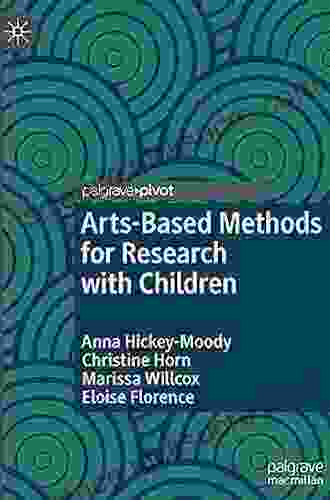
 Dwight BlairArts-Based Methods for Research With Children: Studies in Childhood and Youth
Dwight BlairArts-Based Methods for Research With Children: Studies in Childhood and Youth Melvin BlairFollow ·19.5k
Melvin BlairFollow ·19.5k Finn CoxFollow ·11.1k
Finn CoxFollow ·11.1k Tyrone PowellFollow ·5.5k
Tyrone PowellFollow ·5.5k Truman CapoteFollow ·17.1k
Truman CapoteFollow ·17.1k Floyd PowellFollow ·2.5k
Floyd PowellFollow ·2.5k Randy HayesFollow ·18.6k
Randy HayesFollow ·18.6k John KeatsFollow ·8.1k
John KeatsFollow ·8.1k Brandon CoxFollow ·6.7k
Brandon CoxFollow ·6.7k
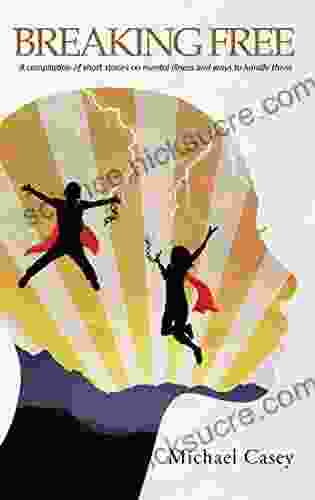
 Deacon Bell
Deacon BellCompilation of Short Stories on Mental Illness and Ways...
Mental illness is a serious issue that affects...

 Jonathan Hayes
Jonathan HayesThe Practical Guide to Raising Courageous and...
As parents, we all want...

 Carlos Fuentes
Carlos FuentesA Journey to Remember: The High Sierra Love Story of...
Prologue: A Wilderness Encounter Beneath...
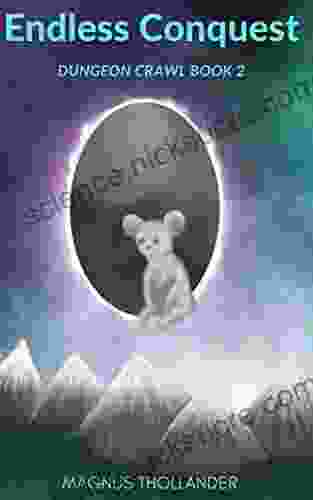
 Douglas Foster
Douglas FosterEndless Conquest: Embark on an Immersive Dungeon Crawl in...
Endless Conquest is a captivating LitRPG...
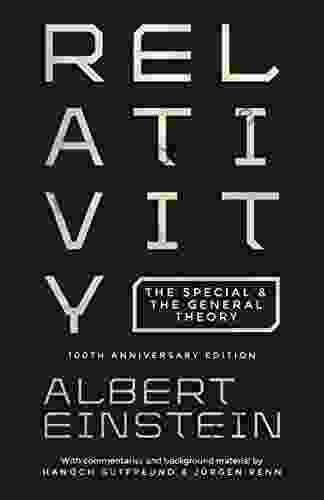
 Caleb Long
Caleb LongThe Special and the General Theory 100th Anniversary...
The year 2015 marks a...
4.6 out of 5
| Language | : | English |
| File size | : | 551 KB |
| Text-to-Speech | : | Enabled |
| Screen Reader | : | Supported |
| Enhanced typesetting | : | Enabled |
| Word Wise | : | Enabled |
| Print length | : | 208 pages |


